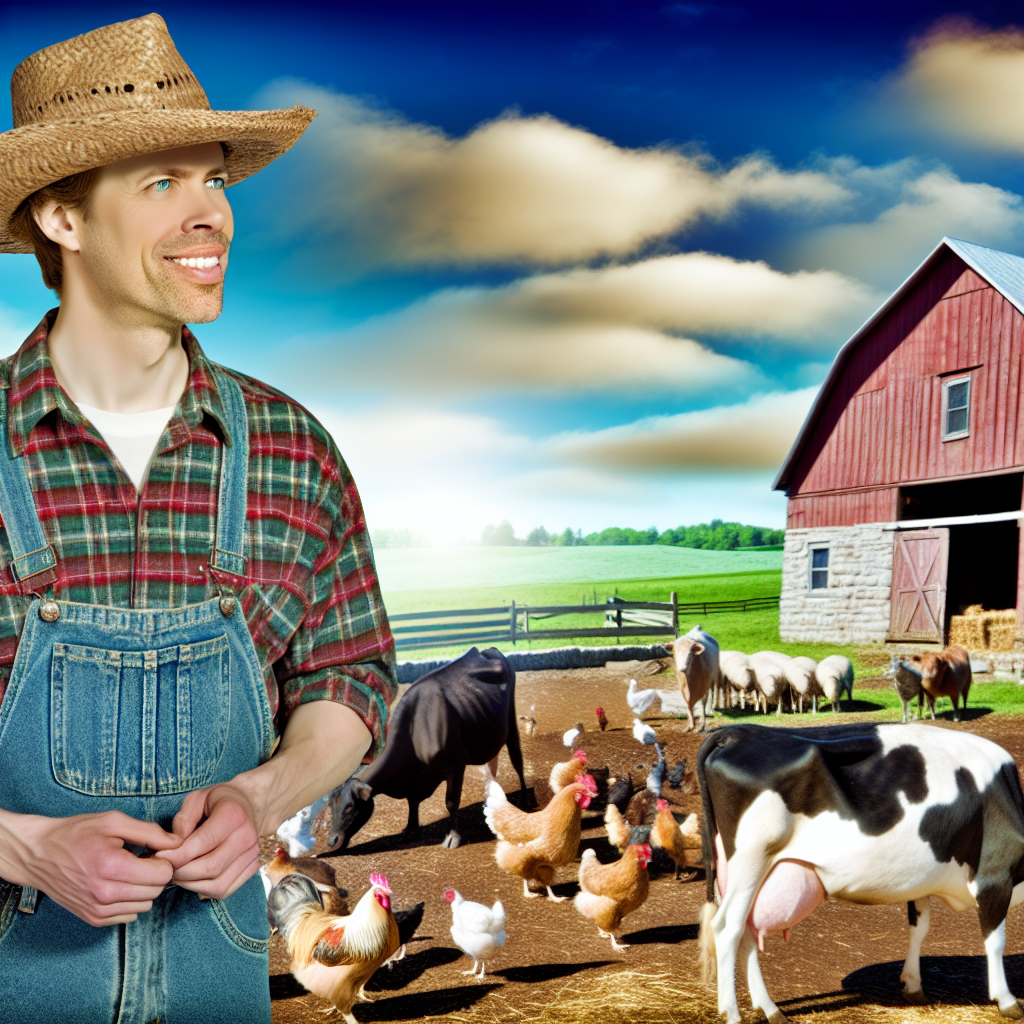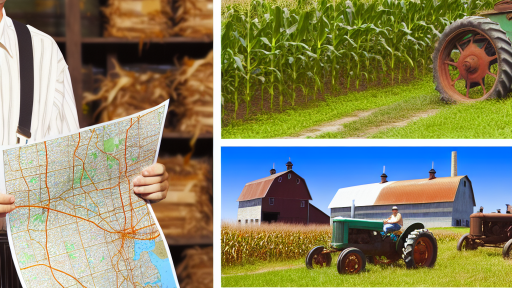Introduction to Ethical Animal Farming
Definition of Ethical Animal Farming
Ethical animal farming prioritizes the welfare of animals.
It emphasizes humane treatment and natural behaviors.
This practice contrasts sharply with conventional methods.
Importance of Ethical Animal Farming
Ethical animal farming is crucial for animal welfare.
It ensures that animals live fulfilling lives.
Furthermore, it contributes to healthier food production.
Benefits of Ethical Practices
Implementing ethical practices leads to various benefits.
- Animals experience reduced stress and better health.
- The quality of animal products improves significantly.
- This approach fosters consumer trust and loyalty.
Environmental Impact
Ethical farming promotes sustainability and reduces pollution.
It supports biodiversity and manages natural resources wisely.
Additionally, it helps combat climate change effectively.
Market Demand
There is a growing consumer demand for ethically sourced products.
Many shoppers are willing to pay a premium for humane options.
This trend encourages farmers to adopt ethical methods.
Key Principles of Ethical Animal Farming Practices
Animal Welfare
Animal welfare is a core principle of ethical farming.
Farmers should ensure all animals receive proper care.
Transform Your Agribusiness
Unlock your farm's potential with expert advice tailored to your needs. Get actionable steps that drive real results.
Get StartedThis includes access to nutrition, clean water, and shelter.
Moreover, animals should have the freedom to express natural behaviors.
Environmentally Sustainable Practices
Ethical animal farming prioritizes environmental sustainability.
Farmers can implement practices that reduce greenhouse gas emissions.
For example, rotational grazing can enhance soil health.
Additionally, using organic feed minimizes chemical runoff.
Transparency in Operations
Transparency builds trust between farmers and consumers.
Farmers should openly share their farming practices and standards.
This allows consumers to make informed choices about their food.
Labeling products with ethical certifications promotes accountability.
Community Engagement
Engaging with local communities is vital for ethical farming.
Farmers can create programs to educate the public about animal welfare.
Additionally, supporting local economies benefits everyone involved.
Advocacy for Better Policies
Ethical animal farming involves advocating for better policies.
Farmers should support legislation that enhances animal welfare standards.
Furthermore, participating in discussions about food safety and practices is important.
Such advocacy can lead to improved conditions for farmers and animals alike.
The Role of Animal Welfare Organizations in Promoting Ethics
Advocacy and Awareness
Animal welfare organizations play a vital role in advocating for ethical practices.
They raise awareness about the importance of humane treatment of animals.
Organizations like the Humane Society International lead campaigns to educate farmers.
Through various programs, they highlight the benefits of ethical animal farming.
Policy Influence
These organizations influence policies aimed at protecting animal rights.
They lobby for legislation that supports humane farming practices.
By working with governments, they help create standards that ensure animal welfare.
Showcase Your Farming Business
Publish your professional farming services profile on our blog for a one-time fee of $200 and reach a dedicated audience of farmers and agribusiness owners.
Publish Your ProfileThis involvement often leads to more stringent regulations on farming practices.
Support for Farmers
Animal welfare organizations also provide resources for farmers.
They offer training programs focused on humane handling techniques.
These resources help farmers improve their operations sustainably.
Farmers who adopt ethical practices often see benefits in productivity.
Public Engagement
Engaging the public is another crucial aspect of these organizations’ work.
They organize events to foster community involvement in animal welfare.
Public support can drive demand for ethically sourced products.
Moreover, they share success stories that inspire changes in farming practices.
Delve into the Subject: Farm-to-School: Boosting Local Farm Economies
Comparative Analysis: Traditional vs. Ethical Animal Farming
Overview of Traditional Animal Farming
Traditional animal farming relies heavily on maximizing production.
This method often prioritizes quantity over animal welfare.
Farmers commonly use confinement systems for livestock.
Rapid growth and high yields are prominent goals.
Additionally, conventional practices often involve antibiotics and hormones.
Impacts of Traditional Practices
These practices can lead to significant animal suffering.
Moreover, they contribute to environmental degradation.
For instance, waste disposal often pollutes nearby water sources.
Land degradation and loss of biodiversity frequently occur as well.
Understanding Ethical Animal Farming
Ethical animal farming emphasizes humane treatment of animals.
This approach prioritizes animal welfare and natural behaviors.
For example, livestock often have access to open spaces.
Farmers implement sustainable practices to protect the environment.
Organic feeding and avoidance of antibiotics are standard.
Benefits of Ethical Practices
Ethical farming leads to healthier animals and better meat quality.
Additionally, it often results in improved soil health.
Consumers increasingly prefer ethically-sourced products.
Thus, ethical practices may enhance market sustainability.
Comparative Outcomes
Ethical animal farming yields positive results for animals.
Moreover, it fosters environmental sustainability.
Conversely, traditional farming often harms animal welfare and the planet.
Thus, supporting ethical farming practices can lead to a better future.
Delve into the Subject: Agri-Tourism: Connecting Farmers with Consumers
Consumer Awareness
Impact of Ethical Choices
Choosing ethical products empowers consumers to drive change.
Shoppers can prioritize animal welfare through informed decisions.
Consequently, this encourages farms to adopt humane practices.
When consumers demand ethical options, the industry must adapt.
Moreover, ethical choices signal a shift in consumer values.
The Role of Transparency
Transparency in labeling helps consumers make informed decisions.
Labels should clearly indicate farming practices used.
Showcase Your Farming Business
Publish your professional farming services profile on our blog for a one-time fee of $200 and reach a dedicated audience of farmers and agribusiness owners.
Publish Your ProfileThis clarity fosters trust between consumers and producers.
As a result, consumers feel more confident in their purchases.
Additionally, transparency supports the growth of ethical farming.
Supporting Local Farmers
Buying ethical products often means supporting local farmers.
Local farms frequently use sustainable and humane practices.
Thus, consumer choices can bolster local economies.
Furthermore, local farming reduces environmental impacts.
Engaged communities benefit from knowing their food sources.
Influencing Industry Standards
Consumer demand for ethical products influences industry standards.
As demand rises, companies are compelled to change practices.
Ethical farming becomes more mainstream as a result.
Subsequently, this leads to larger systemic changes in agriculture.
Consequently, the welfare of animals significantly improves.
Creating Awareness Through Advocacy
Consumer advocacy groups play a crucial role in raising awareness.
These organizations inform the public about ethical choices.
They also encourage documentation of farming practices.
Such activism can lead to improved regulations.
Ultimately, informed consumers help shape a more humane industry.
Explore Further: Maximizing Yields with Organic Small-Scale Methods
Sustainable Practices in Ethical Animal Farming: A Holistic Approach
Defining Sustainable Animal Farming
Sustainable animal farming focuses on ethical treatment and environmental stewardship.
This practice promotes animal welfare while minimizing ecological impact.
Farmers utilize methods that enhance both productivity and sustainability.
Integrating Animal Welfare Standards
Animal welfare is at the heart of sustainable farming practices.
Farmers implement humane treatment protocols to ensure animals thrive.
Every animal deserves access to quality care and a stress-free environment.
Adopting Organic Feed Sources
Using organic feed reduces chemical exposure for animals.
It also promotes healthier ecosystems around the farm.
Farmers often source feed from local organic producers to support regional economies.
Implementing Rotational Grazing
Rotational grazing allows pasture recovery and sustainability.
This method improves soil health and reduces overgrazing.
Farmers observe animal movement patterns for optimal grazing efficiency.
Enhancing Biodiversity on Farms
A diverse farm ecosystem encourages resilience against pests and diseases.
Farmers cultivate various plant species alongside their livestock.
This practice fosters a balanced environment and supports pollinators.
Utilizing Renewable Energy Sources
Renewable energy reduces carbon footprints on farms.
Solar panels and wind turbines generate clean energy for daily operations.
Farmers see long-term savings from investing in renewable technologies.
Engaging in Community-Based Farming Initiatives
Community-supported agriculture fosters a direct connection between farmers and consumers.
Such initiatives improve local food security and community health.
Farmers and consumers collaborate on sustainable practices for mutual benefit.
Showcase Your Farming Business
Publish your professional farming services profile on our blog for a one-time fee of $200 and reach a dedicated audience of farmers and agribusiness owners.
Publish Your ProfileMonitoring and Reporting Practices
Transparency in farming operations builds consumer trust.
Farmers use technology to track animal health and environmental conditions.
Regular reports highlight best practices and encourage continuous improvement.
Explore Further: Sustainable Irrigation Techniques For Modern Farms

Technological Innovations Enhancing Ethical Animal Farming
Smart Farming Technologies
Smart farming technologies improve monitoring and management of livestock.
For instance, sensors track animal health and well-being in real-time.
Farmers can analyze data quickly to make informed decisions.
As a result, they can reduce stress among animals during handling.
Additionally, GPS technology helps manage pasture rotation effectively.
Precision Feed Delivery Systems
Precision feeding systems deliver accurate amounts of feed to animals.
This approach minimizes waste and promotes better nutrition.
Farmers can fine-tune diets to meet the specific needs of each animal.
Consequently, healthy animals contribute to higher quality products.
These systems also allow for monitoring of feeding behavior.
Automation in Animal Care
Automation enhances animal care and management on farms.
Robotic milking systems provide efficient and humane milking methods.
This technology allows cows to be milked at their convenience.
Moreover, automated health monitoring systems detect illnesses early.
This capability reduces the need for antibiotics and stress in animals.
Data-Driven Decision Making
Data analytics tools help farmers make better decisions.
They can collect information from various aspects of farming operations.
These insights lead to improved resource allocation and animal welfare.
Furthermore, farmers can use predictive analytics for future planning.
Ultimately, data-driven decisions foster sustainable practices.
Case Studies of Successful Ethical Animal Farming Operations
Green Pastures Farm
Green Pastures Farm exemplifies ethical animal farming in the Midwest.
The farm uses rotational grazing to improve soil health.
Additionally, they provide their animals with ample outdoor space.
This practice enhances animal welfare significantly.
Moreover, Green Pastures offers transparency with farm tours.
Consumers appreciate understanding the origins of their food.
Sunny Meadows Ranch
They prioritize animal welfare and environmental sustainability.
For instance, they manage a closed-loop system.
This system reduces waste and enhances resource efficiency.
Furthermore, the ranch emphasizes grass-fed beef without antibiotics.
Customers value the ethical and healthy options provided.
Harmony Hill Poultry
Harmony Hill Poultry champions humane treatment of chickens.
They employ a free-range system to maximize bird welfare.
Chickens enjoy access to open fields and natural behaviors.
This approach improves egg quality and consumer satisfaction.
Showcase Your Farming Business
Publish your professional farming services profile on our blog for a one-time fee of $200 and reach a dedicated audience of farmers and agribusiness owners.
Publish Your ProfileAdditionally, they practice organic farming principles.
This commitment attracts conscious consumers seeking ethical choices.
Riverbend Dairy
Riverbend Dairy integrates ethical practices in dairy farming.
They focus on minimal intervention and natural farming techniques.
The cows graze on lush pastures year-round.
This feed results in high-quality, nutrient-dense milk.
Moreover, they provide a stress-free environment for their animals.
As a result, they maintain healthy herds and exceptional yield.
Pine Grove Aquaculture
Pine Grove Aquaculture redefines fish farming through sustainability.
They use polyculture systems to cultivate multiple fish species.
This method promotes biodiversity and ecosystem balance.
Moreover, they avoid harmful chemicals and antibiotics.
Consumers appreciate the taste and quality of their fish.
This farm aligns with the growing demand for responsible seafood.
Regulatory Frameworks: Laws Supporting Ethical Animal Farming
Introduction to Regulatory Frameworks
Regulatory frameworks govern the practices of animal farming.
They ensure humane treatment and animal welfare standards.
These laws vary by region and country.
They aim to protect animals while fostering sustainable practices.
Key Legislation Supporting Ethical Animal Farming
Various acts and regulations support ethical animal farming.
- The Animal Welfare Act establishes basic requirements for animal care.
- Local ordinances often provide additional protections for farm animals.
- International treaties promote humane treatment across borders.
Enforcement and Compliance
Enforcement bodies monitor compliance with these regulations.
Government agencies like the USDA play a crucial role.
They conduct inspections and investigate violations.
Fines and penalties enforce compliance among farmers.
Impact of Regulations on Farming Practices
These regulations shape the way farmers operate their businesses.
Ethical practices lead to higher quality products.
Consumers increasingly demand such ethical standards.
Thus, compliance can enhance marketability and profitability.
Future Developments
As public awareness grows, regulations may evolve.
Innovative practices in animal welfare are emerging regularly.
Ongoing dialogue among stakeholders will guide future laws.
This collaborative approach will ensure continuous improvement.
Challenges and Criticisms of Ethical Animal Farming Practices
Economic Viability
Adopting ethical animal farming practices often involves higher costs.
These increased expenses can challenge farmers’ economic sustainability.
Consequently, many farmers struggle to compete with conventional farming prices.
Market demand for ethically produced products may not match production costs.
Consumer Awareness and Education
Many consumers lack awareness of ethical farming practices.
As a result, they may not prioritize purchasing ethically sourced products.
This lack of education affects the demand for sustainable options.
Increasing consumer knowledge could potentially boost the market for ethical products.
Regulatory Hurdles
Different regions have varying regulations regarding animal welfare.
Showcase Your Farming Business
Publish your professional farming services profile on our blog for a one-time fee of $200 and reach a dedicated audience of farmers and agribusiness owners.
Publish Your ProfileFarmers may face significant challenges negotiating these regulations.
Compliance with these laws often requires substantial investments in infrastructure.
This can divert resources away from improving animal welfare directly.
Health and Welfare of Animals
Some critics argue that ethical practices still fall short of ideal animal welfare.
They assert that even ethical farming can lead to stress and suffering.
Animal behavior and psychological needs are sometimes overlooked.
Advocacy groups continue to push for higher standards.
Industry Resistance
Conventional farming industries often resist changes to ethical practices.
They argue that such changes can threaten livelihoods and economic stability.
This resistance can slow the adoption of ethical standards.
Furthermore, misinformation from the conventional sector creates public confusion.
Impact on Food Prices
The cost of ethically produced food often translates to higher consumer prices.
This can alienate low-income consumers from accessing ethical options.
Balancing affordability with humane treatment remains a significant challenge.
Addressing this issue requires innovative approaches within the food system.
Additional Resources
Putting Meat on the Table: Industrial Farm Animal Production in …
What it Takes to Make a Decent Living Raising Ethical Meat | Civil Eats




